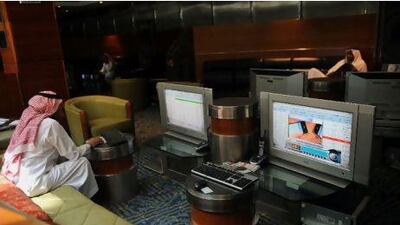The appointment last week of Fahd bin Abdullah Al Mubarak as the governor of the Saudi Arabian Monetary Agency (Sama), the kingdom's central bank, was a surprise in several respects and a minor victory for the country's modernisers.
Tomorrow's exclusives tonight:
Industry Insights e-newsletter Stay ahead of the pack and get the pick of the premium Business content straight to your inbox. Sign up
Mr Al Mubarak was given a job that has traditionally been reserved for Saudis who had loyally served their time within Sama's complicated bureaucracy; Muhammad Al Jasser, his predecessor, did three years in the top job, but had previously served a decade in less senior Sama positions.
In contrast, Mr Al Mubarak came direct from the sharp edge of the investment banking business, where he was the chairman and managing director of Morgan Stanley's Saudi business.
He had also been the chairman of the Tadawul, the Saudi stock exchange, and had played an important advisory role in the 2002 privatisation of Saudi Telecom. "Nobody before has been head of Sama who has had this degree of private-sector experience," says a senior Saudi expert.
With a doctorate in business administration from the University of Houston in Texas (a favoured learning centre for the Saudi elite), Mr Al Mubarak also served on the Shura Council, the government advisory body, a mark of his acceptability to the kingdom's establishment.
In other respects, he is something of an outsider: he comes from Hofuf in the kingdom's eastern province of Al Ahsa, rather than the traditional breeding ground for Saudi's ruling elite in the Buraidah region north of Riyadh. In his early 50s, he is also comparatively young by the standards of the Saudi ruling classes.
"He's a break from tradition, and will bring a new perspective on the big issues currently facing the Saudi economic and financial system." says the Saudi expert.
Sama has two main roles: a responsibility (along with the ministry of finance) for the kingdom's monetary policy; and the position of top regulator for the banking and financial sectors. Each has its challenges.
Regulation is probably the most straightforward. The Saudi banking system is well capitalised, with high ranking on the international "stress test" criteria such as capital and liquidity ratios.
Nevertheless, it went through a mini-crisis two years ago following the "name lending" scandal that resulted in the downfall of two of the kingdom's biggest financial players, the Al Gosaibi business empire and the Saad Group, owned by Maan Al Sanea.
Sama participated in the government's task force that investigated that disaster, and put its name to the eventual recommendations of the so-called "king's committee" that told the two groups to sort out their problems and settle with Saudi bank creditors.
"There has been a significant amount of progress in dealing with the 'name lending' problems already," says Jarmo Kotilaine, the chief economist at Saudi Arabia's National Commercial Bank. "The banks have largely dealt with the issue themselves, and Sama will support them."
It remains to be seen whether Mr Al Mubarak will take a new stance towards the international creditors of the Al Gosaibi affair, left with some US$16 billion (Dh58.77bn) of debts that some fear will never be settled.
Another priority for the new governor will be to encourage a further expansion of bank credit within the economy. Lending virtually dried up in the aftermath of the 2008 liquidity crisis, and while there has been some improvement, the growing economy needs more.
"There needs to be further growth in the domestic credit market," Mr Kotilaine says. "Year-on-year credit growth has been around 10 per cent, but with inflation at 5 per cent or so, more could be done."
Inflation is still an issue for the Saudi economy, especially in relation to rents and food prices for its young population with a large employment problem.
The government reacted quickly and decisively to the issues raised in other Middle East countries by the Arab Spring, with a $130bn programme of public investment. But this also brings its own inflationary pressures, which Mr Al Mubarak will have to manage.
The government recently announced it was considering a series of sukuk (Islamic bond) issues specifically designed to support infrastructure investment, and it will probably fall on Sama to organise the details of that sales programme.
Mr Al Mubarak will play a big role in two other areas of crucial importance to the country, and the kingdom's standing in the global financial community: the further opening up of the economy to international investors; and the stop-go question of greater monetary union in the GCC region.
"There is agreement on the desirability of an open economy and more competitive marketplace, but in Saudi there has to be continuity too," Mr Kotilaine says.
On GCC monetary union, a process has started, but a final plan is still some way off. "The regional markets are not ready for a significantly different exchange rate regime, even if the political will could be found," Mr Kotilaine says.
Mr Al Mubarak has plenty in his in-tray to be getting on with.
twitter: Follow our breaking business news and retweet to your followers. Follow us

